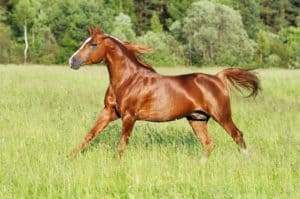30 Years of Equine Nutrition Research: What Have We Learned?

Equine nutrition and exercise physiology researcher Joe Pagan, PhD, formed Kentucky Equine Research (KER) in 1988. In the three decades following, he and his staff have witnessed the evolution of equine nutrition and research trends. At KER’s 2018 Conference, held Oct. 29-30 in Lexington, he described the research environment over the past 30 years.
Developmental Disorders
In 1980s Central Kentucky, the Thoroughbred capital of the world, most equine nutrition research centered around broodmares, growing horses, and performance horses—“the do all and end all” in that region of the country, said Pagan.
While things like equine metabolic syndrome (EMS) and geriatric health weren’t yet on scientists’ radars, he said, developmental orthopedic disease (DOD, a catchall phrase for disease affecting the skeleton of growing horses) was. This was primarily because flaws that showed up on the radiographs of yearlings and 2-year-olds at Thoroughbred sales devalued those horses greatly
Create a free account with TheHorse.com to view this content.
TheHorse.com is home to thousands of free articles about horse health care. In order to access some of our exclusive free content, you must be signed into TheHorse.com.
Start your free account today!
Already have an account?
and continue reading.

Written by:
Alexandra Beckstett
Related Articles
Stay on top of the most recent Horse Health news with












